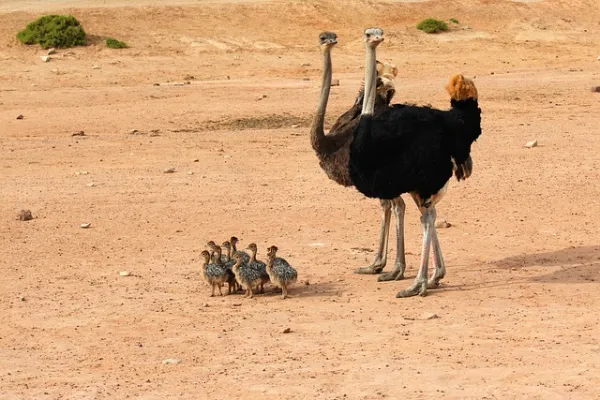
The Diversity of the Animal Kingdom
Animal kingdom is vast and varied, filled with captivating creatures that continuously astonish us. From insects to mammals, each species possesses unique characteristics and plays a crucial role in maintaining the delicate equilibrium of our ecosystem.
One of the aspects of the animal kingdom lies in its astonishing diversity. With over 1.5 million identified species, scientists believe that there could be millions yet to be discovered. Whether deep within the oceans or high atop mountains, animals have adapted themselves to flourish in every corner of our planet.
Animal kingdom, a diverse realm that exists on our planet, is a captivating topic that never fails to inspire awe and fascination. With its range of species, behaviors, and adaptations, the animal kingdom serves as a mesmerizing tapestry that showcases the beauty and complexity of life itself. We celebrate the remarkable diversity of creatures that coexist with us while exploring their unique ways of adapting, communicating, and contributing to the delicate balance of nature.
The Classification of Animals

In order to gain an understanding of the animal world, researchers have organized animals into categories based on their unique traits. The classification system widely utilized is the one established by Carl Linnaeus during the 18th century, which divides animals into seven primary groups:
- 1. Mammals
- 2. Birds
- 3. Reptiles
- 4. Amphibians
- 5. Fish
- 6. Invertebrates
- 7. Arthropods
Every group of animals has its own characteristics and qualities that set it apart from the rest. For instance, mammals are known for their capability to breastfeed their offspring, whereas birds possess feathers and lay eggs.
The Importance of Biodiversity
The animal kingdom is not only an awe-inspiring aspect of our world; it also plays a vital role in maintaining the delicate balance of our planet’s ecosystems. Biodiversity, which refers to the variety of life forms on Earth, is crucial for ensuring the stability and sustainability of our environment.
Animals, being a part of the intricate tapestry of life, have significant contributions to various ecological processes. They assist in tasks such as pollination, dispersal of seeds, recycling nutrients, and controlling pests. Bees are an example of pollinators whose absence would greatly hinder the ability of many plant species to reproduce.
Animals often occupy positions at the top of the food chain, thereby regulating the populations of species. Predators play a role in managing herbivore populations by preventing overgrazing and promoting ecosystem health.
The Threats to the Animal Kingdom
Unfortunately, the animal world is encountering dangers as a result of human activities. The destruction of habitats, pollution, climate change, and poaching are a few of the challenges that animals currently face.

For example, deforestation not only destroys the homes of species but also disrupts entire ecosystems. Pollution, such as waste in our oceans, poses a threat to marine life. Climate change, caused by the emission of greenhouse gases, has consequences for species as it alters their habitats and disrupts their natural life cycles.
Preserving the Animal Kingdom
We have a responsibility to safeguard and preserve the animal kingdom for generations. It is crucial to engage in conservation efforts, such as establishing protected areas and promoting practices. These actions are vital to ensuring the survival of endangered species and maintaining the well-being of ecosystems.
Furthermore, it is important to raise awareness about biodiversity’s significance. The challenges faced by animals. Educating people and advocating for change can inspire individuals and communities to take steps towards protecting our environment.
The animal world faces challenges caused by the destruction of their habitats, climate change, and illegal hunting. Numerous species are at risk of extinction, which has an impact on ecosystems and human welfare. It is crucial to prioritize conservation measures in order to safeguard wildlife worldwide.
This entails implementing efforts such as habitat restoration, the preservation of biodiversity hotspots, and active community involvement. Organizations and strategies play a role in wildlife conservation as they work towards maintaining the diversity of our planet’s fauna.
Animal Behavior
The behavior of animals in the animal kingdom is truly fascinating. It’s incredible to see how they migrate long distances in search of food or to reproduce. Animals communicate not through sounds but through body language, chemical signals, and even bioluminescence in the deep sea. The social structures within animal communities reveal how they cooperate and establish hierarchies.
The territorial behavior of animals is a captivating study that shows how they mark and protect their territories. The hunting and foraging strategies employed by animals are truly remarkable, from the tactics of predators to the foraging techniques used by herbivores.
Famous Animals

Animals have always had an influence on culture. We hold admiration and curiosity for predators such as lions, tigers, and wolves. For thousands of years, domesticated creatures like dogs and graceful horses have been our trusted companions.
Moreover, animals play a role in symbolism, spiritual beliefs, and mythologies across diverse societies. They even bring joy. Serve as symbols for sports teams, brands, and popular culture in both real and fictional realms.
The animal kingdom is a diverse realm that deserves our respect and protection. By understanding and cherishing the array of species that inhabit our planet, we can collaborate effectively in securing their existence while preserving this awe-inspiring natural world.
The animal kingdom is truly fascinating, filled with a variety of creatures each playing a role in our ecosystem. Studying the animal kingdom does not expand our understanding of life on Earth. Also highlights the significance of preserving and treating animals ethically. By exploring and safeguarding the wonders of the animal kingdom, we secure a future where these incredible beings can flourish and continue to amaze us with their beauty and resilience.
Leave a Reply